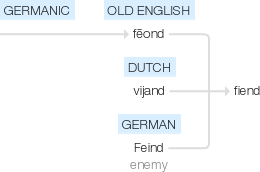Fiend
Old English fēond ‘an enemy, the devil, a demon’, of Germanic origin; related to Dutch vijand and German Feind ‘enemy’.
wiktionary
From Middle English feend, fēnd, fiend, feond, viend, veond(“enemy; demon”), from Old English fēond(“enemy”), from Proto-Germanic *fijandz.
Compare Old Norse fjándi (Icelandic fjandi, Danish fjende, Norwegian fiende, Swedish fiende, West Frisian fijân, Low German Feend, Fiend, Dutch vijand, German Feind, Gothic 𐍆𐌹𐌾𐌰𐌽𐌳𐍃( fijands)), with all of them meaning foe. The Old Norse and Gothic terms are present participles of the corresponding verbs fjá/ 𐍆𐌹𐌾𐌰𐌽( fijan, “to hate”), from Proto-Indo-European *peh₁-(“to hate”) (compare Sanskrit पीयति(pī́yati, “(he) reviles”)).
etymonline
fiend (n.)
Old English feond "enemy, foe, adversary," originally present participle of feogan "to hate," from Proto-Germanic *fijand- "hating, hostile" (source also of Old Frisian fiand "enemy," Old Saxon fiond, Middle Dutch viant, Dutch vijand "enemy," Old Norse fjandi, Old High German fiant, Gothic fijands), from suffixed form of PIE root *pe(i)- "to hurt" (source also of Sanskrit pijati "reviles, scorns;" Avestan paman-, name of a skin disease; Greek pema "disaster, sorrow, misery, woe;" Gothic faian "to blame").
As spelling suggests, the word originally was the opposite of friend (n.). Both are from the active participles of the Germanic verbs for "to love" and "to hate." Boutkan says the "fiend" word was a Germanic analogical formation from the "friend" word. According to Bammesberger ["English Etymology"], "The long vowel in FIEND is regular. In FRIEND the vowel has been shortened; perhaps the shortening is due to compounds like FRIENDSHIP, in which the consonant group (-nds-) regularly caused shortening of the preceeding long vowel."
Fiend at first described any hostile enemy (male and female, with abstract noun form feondscipe "fiendship"), but it began to be used in late Old English for "the Devil, Satan" (literally "adversary") as the "enemy of mankind," which shifted its sense to "diabolical person" (early 13c.). The old sense of the word devolved to foe, then to the imported word enemy. For spelling with -ie- see field. Meaning "devotee (of whatever is indicated)," as in dope fiend, is from 1865.
